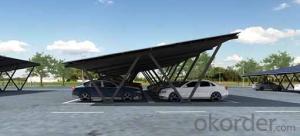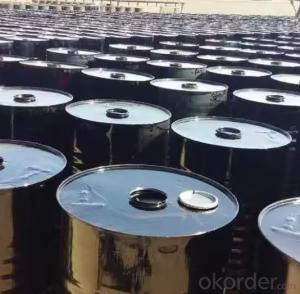solar carport mounting system
- Loading Port:
- China Main Port
- Payment Terms:
- TT OR LC
- Min Order Qty:
- -
- Supply Capability:
- -
OKorder Service Pledge
Quality Product, Order Online Tracking, Timely Delivery
OKorder Financial Service
Credit Rating, Credit Services, Credit Purchasing
You Might Also Like
Product Features
• No location limitation
• Simple structure, easy & quick installation
• Use standard components, low maintenance cost
• Easy to be packaged, minimized transportation cost
• Removable & reusable
• With waterproof & non-water proof solutions for choice
• Customization available
- Q:How do solar energy systems impact the stability of the electricity supply?
- Solar energy systems can have a positive impact on the stability of the electricity supply by diversifying the energy mix and reducing reliance on traditional fossil fuel-based power plants. By harnessing the sun's energy, solar systems contribute to a more decentralized and resilient grid, which can help to mitigate the risk of power outages. However, the intermittent nature of solar power generation can also pose challenges to grid stability, requiring effective management and integration of solar energy into the overall electricity system.
- Q:Do solar energy systems require a lot of maintenance?
- No, solar energy systems generally require very little maintenance.
- Q:What is the role of solar energy systems in reducing dependence on fossil fuels?
- Solar energy systems play a crucial role in reducing dependence on fossil fuels by providing a clean and renewable alternative for generating electricity. By harnessing the power of the sun, solar energy systems eliminate the need to burn fossil fuels, reducing greenhouse gas emissions and mitigating climate change. They offer a sustainable solution for meeting our energy needs while decreasing our reliance on finite and polluting fossil fuel sources.
- Q:How does solar energy affect property value?
- Solar energy can significantly increase property value by reducing energy costs, offering potential tax incentives, and appealing to environmentally conscious homebuyers.
- Q:Can solar energy systems be installed in urban areas?
- Yes, solar energy systems can be installed in urban areas. In fact, urban areas offer great potential for solar installations due to the availability of rooftops, parking lots, and other spaces where solar panels can be mounted. With advancements in solar technology and innovative installation methods, urban areas can benefit from clean and renewable solar energy to meet their power needs.
- Q:Can solar energy systems be used in areas with limited access to electricity grids?
- Yes, solar energy systems can be effectively used in areas with limited access to electricity grids. Solar panels can be installed in such areas to harness sunlight and convert it into electricity, eliminating the need for connection to traditional power grids. This enables communities and individuals to access clean and renewable energy, powering their homes, businesses, and other activities. Additionally, solar energy systems can be combined with energy storage solutions, such as batteries, to store excess energy for use during nighttime or cloudy periods, further ensuring a reliable and continuous power supply.
- Q:Can solar energy systems be used in powering amusement arcades or gaming centers?
- Yes, solar energy systems can be used to power amusement arcades or gaming centers. Solar panels can be installed on the roof or in nearby open spaces to harness sunlight and convert it into electricity. This renewable energy can then be used to power the electrical equipment, lighting, and other energy-consuming devices within the amusement arcade or gaming center. Implementing solar energy systems not only reduces reliance on traditional energy sources but also saves costs in the long run and promotes sustainable practices.
- Q:Can solar energy systems be used in areas with high wind conditions?
- Yes, solar energy systems can be used in areas with high wind conditions. While solar energy systems primarily rely on capturing sunlight to generate electricity, they can still function effectively in areas with high wind conditions. In fact, solar panels are designed to withstand various weather conditions, including strong winds. These panels are typically mounted securely to ensure they can withstand the force of the wind. Additionally, wind conditions can even have a positive impact on solar energy generation. Wind can help to cool down the solar panels, which can increase their efficiency and overall output. Therefore, areas with high wind conditions can still benefit from the installation of solar energy systems.
- Q:Can solar energy systems be installed on agricultural land?
- Yes, solar energy systems can be installed on agricultural land. In fact, many farmers and agricultural businesses are increasingly adopting solar power systems to generate clean and renewable energy for their operations. These systems can be installed on rooftops, unused land, or even integrated into farming infrastructure such as irrigation systems or livestock shelters. By utilizing agricultural land for solar energy, farmers can diversify their income, reduce energy costs, and contribute to a more sustainable future.
- Q:What are the disadvantages of using solar energy systems?
- Solar energy systems offer numerous benefits, but it is important to consider the drawbacks as well. There are several disadvantages associated with using solar energy systems, including the following: 1. High initial costs: The installation and setup of solar panels and necessary equipment can be expensive. This can be a significant investment for homeowners or businesses, making it less viable for those with limited financial resources. 2. Dependence on sunlight: Solar energy systems rely on sunlight to generate electricity. As a result, energy production can be intermittent, as they do not generate electricity during cloudy days or at night. To overcome this limitation, energy storage systems or backup power sources are needed, which can increase costs. 3. Space requirements: Large-scale solar energy systems require a significant amount of space for installation. This can be a challenge in densely populated areas or places with limited land availability. Additionally, rooftop installation may not be possible for buildings with structural limitations or in shaded areas. 4. Environmental impact of manufacturing: While solar energy systems produce clean and renewable energy, the manufacturing process can have environmental consequences. The production of solar panels involves the use of potentially hazardous materials and requires a significant amount of energy. The disposal of these panels at the end of their lifespan also presents environmental challenges. 5. Performance variability: The efficiency of solar panels can vary depending on factors such as location, weather conditions, and maintenance. Dust, debris, or shading can reduce their efficiency, necessitating regular cleaning and maintenance. 6. Limited energy storage capacity: Storing excess energy generated by solar panels is vital for consistent power supply during periods of low sunlight. However, current energy storage technologies, such as batteries, have limited capacity and can be expensive, restricting the ability to store large amounts of energy for later use. 7. Geographic limitations: Not all regions receive the same amount of sunlight, which affects the efficiency and effectiveness of solar energy systems. Areas with low solar radiation or extreme weather conditions may not be suitable for efficient harnessing of solar energy. Despite these disadvantages, ongoing technological advancements and research aim to address these challenges and make solar energy systems more accessible, efficient, and cost-effective.
1. Manufacturer Overview |
|
|---|---|
| Location | |
| Year Established | |
| Annual Output Value | |
| Main Markets | |
| Company Certifications | |
2. Manufacturer Certificates |
|
|---|---|
| a) Certification Name | |
| Range | |
| Reference | |
| Validity Period | |
3. Manufacturer Capability |
|
|---|---|
| a)Trade Capacity | |
| Nearest Port | |
| Export Percentage | |
| No.of Employees in Trade Department | |
| Language Spoken: | |
| b)Factory Information | |
| Factory Size: | |
| No. of Production Lines | |
| Contract Manufacturing | |
| Product Price Range | |
Send your message to us
solar carport mounting system
- Loading Port:
- China Main Port
- Payment Terms:
- TT OR LC
- Min Order Qty:
- -
- Supply Capability:
- -
OKorder Service Pledge
Quality Product, Order Online Tracking, Timely Delivery
OKorder Financial Service
Credit Rating, Credit Services, Credit Purchasing
Similar products
New products
Hot products
Hot Searches
Related keywords




























